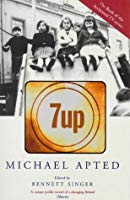
- Cover of 7 Up
Since our 780 Research Methods class doesn’t have a Blackboard site for the class, I’ll post my various links and thoughts to the blog, tagged with “780.”
I wonder if Michael Apted’s wonderful Up series of documentary interviews would be an example of a kinda sorta longitudinal study or panel study? When a new film comes out every 7 years with updates on these people, it’s always fascinating to see where life has -- or hasn’t -- taken them. Instead of gathering statistics about a large group of people, there's something very satisfying about getting to know a small group of people very well.
We’ve been talking about experiments, planning a study, theories, types of studies, etc. One of our last readings was about where one gets ideas for theories. This reminded me of Seth Roberts, a Berkeley researcher in psychology, who frequently touts self-experimentation as a way to generate research ideas. This is one of his more famous papers. He maintains an active and entertaining blog.
What I admire about Seth Roberts is his abundant idea-generation and his zeal for measurement and record-keeping. His goal is to experiment on himself first, then if his data indicates that there are possibly interesting results, then he proceeds with more methodical testing and inquiry, possibly leading to more formalized studies (or not).
When I’ve been thinking about possible studies I might like to try, I remember this quote from one of his blog posts:
SR: Tell me something you've learned about research design.
BW: When I was a graduate student [at the Stanford Business School], I would jog on the school track. One day on the track I met a professor who had recently gotten tenure. He had only published three articles (maybe he had 700 in the pipeline), so his getting tenure surprised me. I asked him: What's the secret? What was so great about those three papers? His answer was two words: "Cool data." Ever since then I've tried to collect cool data. Not attitude surveys, which are really common in my area. Cool data is not always the easiest data to collect but it is data that gets buzz, that people talk about.
Thinking about what “cool data” might mean in a digital curation or archival or info-science context can be tough. I think the social networks are certainly perceived as cool and you can do cool stuff with them, certainly, but I’m not that curious about them. I feel like, were I to study one of them, I’d just be chasing a parade that’s got a five-mile headstart. Better to find my own parade. :)
Curiosity is probably what drives me. Certainly, one of the itches that a researcher must scratch is his or her own personal obsession with some nagging question or detail that no one has really addressed or answered to their satisfaction. (The same way most writers have to write their own poems, stories, and plays, because no one else is publishing what they want to read.)
Check out his numerous posts tagged scientific method (though he’s more usually critical of scientists’ behavior than the method itself) and self-experimentation for more.
Another great Seth Roberts post that got my attention was this one on appreciative thinking, especially as it relates to reading journal articles. I see what he describes in the classes I attend, where we read a paper that’s 1 year, 5 years, or 10 years old, and it’s rather thoroughly shredded during the ensuing discussion for any number of reasons (and I've been guilty of trashing articles, myself).
Instead of this negative critical thinking, I like his suggested questions to ask instead, especially the simplicity of his fifth question: “What’s interesting or enjoyable about it?” Even if I find the writing of an article stilted or atrocious, I think it should be possible to at least admire a piece’s energy, its intent, its point of view, its ability to stir thoughts in me, etc. Saying something constructive is not about becoming a positive-thinking ninny; it's about seeing more sides of the issue than only one.
Even for a piece (Mabry's "Reference Interview as Partnership") that didn’t really touch me, I appreciated that this was the author's distillation of a career’s worth of lessons that she wanted to impart. In my summary of the piece, I said I could see it being used to start a conversation about one’s own personal manifesto for serving at a reference desk. We’re not often asked to reflect on our larger purpose or philosophy when it comes to our jobs, or even our career, so I saw the Mabry piece as a terrific starting point for such a conversation.
Speaking of writing up experiments so they’re repeatable -- how often does repeating an earlier experiment really happen?